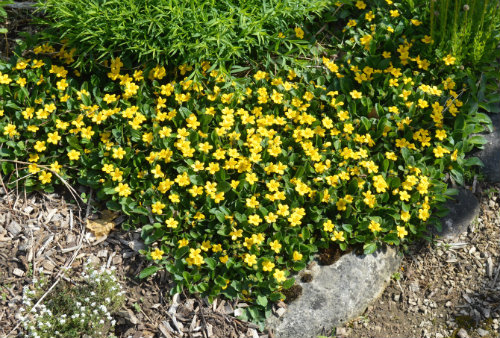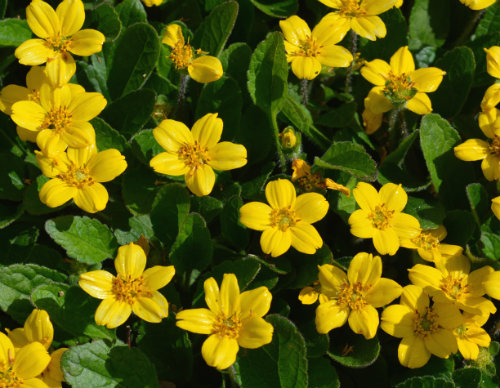Plant of the Month for July, 2018

(kris-OG-oh-num vir-jin-eeAN-um)
General Information:
Chrysogonum virginianum ‘Norman Singer’ adds great color to an early summer garden and is easy to grow. It forms a mat that is thick enough to keep out most weeds, it does not need deadheading and it is semi-evergreen, making it almost no-maintenance. The only thing you need to do is reduce the size of the clump every 2-3 years.

The Norman Singer clone was selected for its larger flowers and the fact that the flower stem is shorter than the species which makes for a nicer display. It was originally called Norman Singer’s clone, after the North American Rock Garden Society member who found it. More recently, it can also be found under the name Chrysogonum virginianum ‘Superstar’.
The species grows in part shade conditions along the edge of woodlands in moist conditions. It can take quite a bit of shade and is deer resistant. I did not know that when I got my Norman Singer cultivar, so I planted it in a zone 5 rock garden, in full sun. It does quite well there in clay soil and without extra water. This seems like a very adaptable species, but it is possible that Norman Singer is more tolerant of full sun than the species.

It is a great ground cover even when not flowering, forming very tight mats of green. The clump spreads using rhizomes which are easily pulled out to keep it in control. The dazzling flowers appear in late spring and early summer and reappear in fall for a subdued display. Every garden should have this plant.
Common names for the species include green-and-gold, gold cup and golden star.
Life Cycle: perennial
Height: 5cm (2in)
Bloom Time: late spring
Natural Range: Eastern North America, from Pennsylvania to Florida
Habitat: edge of deciduous forests, mesic to dry woodlands and open rocky woodlands
Synonyms: Chrysogonum australe
Cultivation:
Light: full sun to full shade
Soil: prefers moist rich soil, but is very tolerant
Water: consistent moisture
USDA Hardiness Zone: 5 – 9
Propagation: division
Seedex availability (ORG&HPS annual Seed Exchange): never
